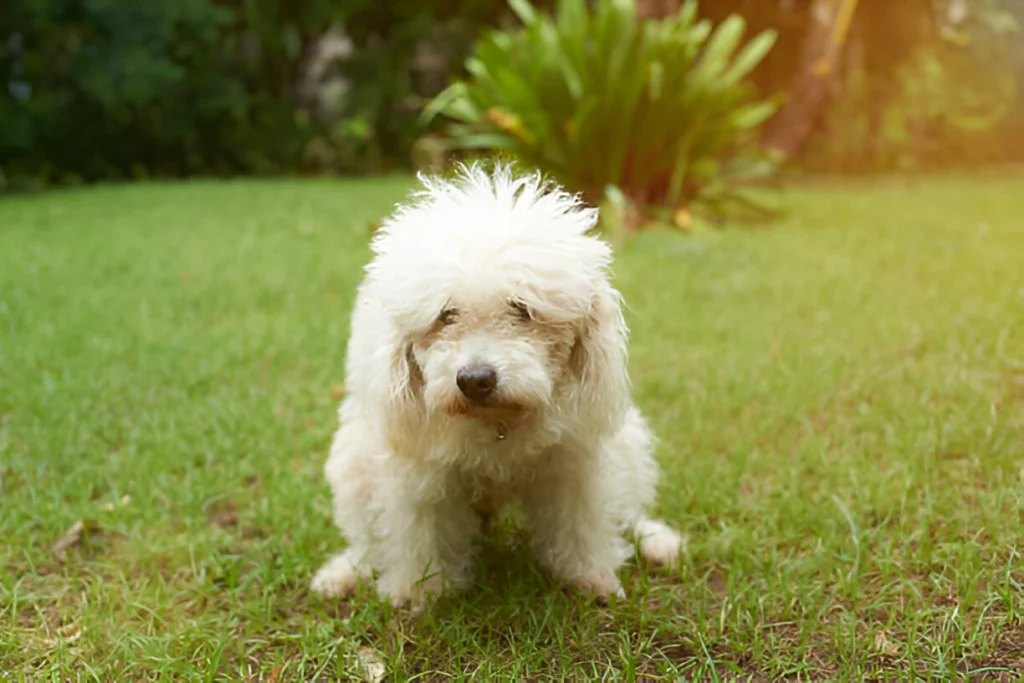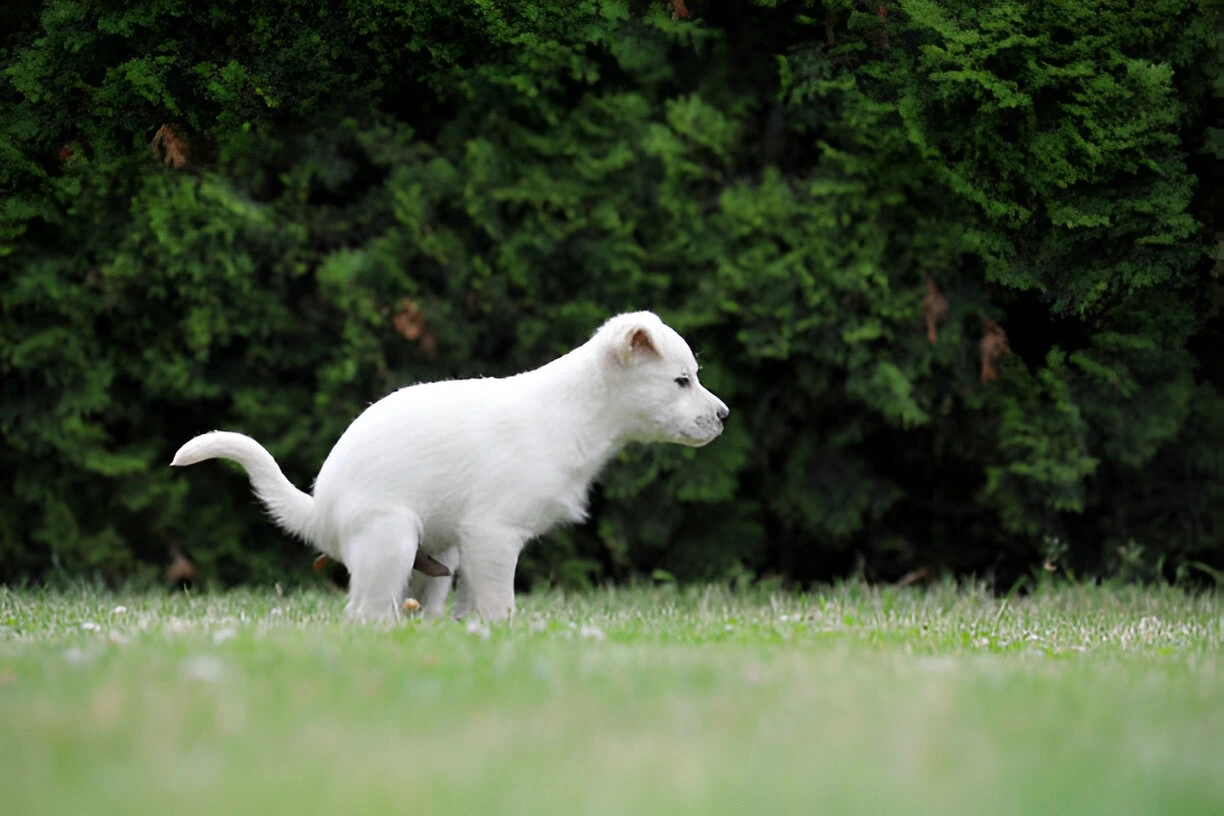Written By Dr Pam, Certified Professional Dog Trainer (CPDT-KA) with 8+ years of experience in puppy behavior. Reviewed by Dr. Masoud Onsori, DVM, of the American Veterinary Medical Association (AVMA).
Hey there, fellow dog parent! If you’ve ever watched your furry buddy circling endlessly in the yard, straining without success, or just looking downright uncomfortable, you know the worry that comes with it. My own rescue pup, Bella, had a bout of constipation last year after switching foods too quickly—it was stressful for both of us. But don’t panic! Whether you’re dealing with a constipated adult dog or a puppy struggling to poop, there are safe, vet-backed ways to get things moving fast.
Important Disclaimer: This isn’t a substitute for professional advice. Always chat with your vet before trying remedies, especially for puppies, seniors, or dogs with health issues. Constipation can signal something serious, so if symptoms persist beyond 24-48 hours or include vomiting, blood, or lethargy, head to the vet ASAP.
In this guide, we’ll dive into quick tricks, natural remedies, puppy-specific tips, and prevention strategies. Let’s help your dog feel better—pronto!
Quick Relief Summary: How to Make Your Dog Poop Faster
Stuck in a poop emergency? Here’s a snapshot of the top vet-approved fixes to try first. These focus on hydration, fiber, and movement for fast, natural relief.
- Hydrate Smartly: Add low-sodium broth to their water or switch to wet food temporarily to soften stools.
- Fiber Boost with Pumpkin: Mix in plain canned pumpkin—1-2 tsp for small dogs/pups, 1-2 tbsp for larger ones.
- Get Moving: A 10-15 minute brisk walk post-meal stimulates the bowels naturally.
- Gentle Massage: Rub their belly in circular motions to encourage movement (great for puppies too!).
These can work in as little as a few hours, but monitor closely..
What Is Dog Constipation and Why Does It Happen?Constipation in dogs means they’re having trouble passing stool—think hard, dry poops or no poops at all for 24+ hours. It’s super common, but puppies might experience it differently due to their developing systems or teething habits. Common culprits include:
- Dehydration: Not enough water intake hardens stools.
- Diet Issues: Low-fiber foods or sudden changes.
- Lack of Exercise: Sedentary pups (hello, couch potatoes!) have slower digestion.
- Stress or Changes: New home, travel, or routine disruptions.
- Foreign Objects: Swallowing toys, bones, or socks can block things up.
- Age Factors: Puppies might struggle from weaning stress; seniors from slower metabolism.
- Health Problems: Things like hypothyroidism, prostate issues, or matted fur in long-haired breeds (e.g., Shih Tzus or Golden Retrievers).
- Gut Imbalance: Antibiotic use or poor diet messing with good bacteria.
Read This How to Potty Train a Puppy: A Veterinarian-Approved Guide to Success
Signs Your Dog or Puppy Is Constipated: What to Watch For
Not sure if it’s constipation? Look out for these red flags. Puppies might show subtler signs since they’re smaller and more vulnerable.
- Straining, whimpering, or crouching without results.
- Small, hard, pebble-like stools—or none for 24-48 hours.
- Restlessness, bloating, or extra gas.
- Loss of appetite, vomiting, or blood/mucus in stool (emergency alert!).
- Swollen or red anus, especially in long-haired breeds.
For puppies: They might whine more during attempts or seem extra fidgety. If your pup hasn’t pooped since their last meal, act fast—they dehydrate quicker than adults.
Quick Tricks: How to Make a Dog Poop Instantly (For Non-Constipated Pups)
Sometimes, you just need your dog to go now—like during a quick walk before work. These everyday hacks work for healthy dogs with normal routines.
- Post-Meal Walk: Time a 10-minute stroll right after eating to tap into natural digestion reflexes.
- Belly Rub: Gentle circular massages from ribs to hips can kickstart things.
- Familiar Spot: Return to their usual potty area; scents trigger the urge.
- Ice Cube Trick (Anecdotal but Puppy-Friendly): For stubborn pups, gently rub an ice cube near the anus to stimulate—works like a charm in cold weather emergencies, but skip if they’re stressed.
These aren’t for constipated cases—use remedies below instead.
Effective Remedies: How to Make a Constipated Dog Poop Quickly and Naturally
For actual constipation, focus on these safe, home-based solutions. Start with one or two, and always consult your vet first. Adjust for size: smaller doses for toy breeds or puppies
| Remedy | How to Use | Why It Works | Breed/Pup Notes |
|---|---|---|---|
| Canned Pumpkin | 1-2 tsp (small dogs/pups), 1-2 tbsp (large). Mix into food. | High fiber and moisture softens stools. | Great for all; puppies love the taste—avoid pie filling! |
| Hydration Hacks | Add broth to water, offer ice cubes, or switch to wet food. | Prevents dry stools; aim for 1 oz water per lb body weight daily. | Essential for brachycephalic breeds (e.g., Bulldogs) who tire easily. |
| Exercise | Short 10-15 min walks 2-3x daily. | Stimulates bowels without strain. | Low-impact for seniors; playful for energetic breeds like Labs. |
| Probiotics | Vet-recommended dog-specific supplements. | Balances gut bacteria for better digestion. | Helpful post-antibiotics; start slow with puppies. |
| Veggie Add-Ins | Small amounts of cooked green beans or carrots. | Boosts fiber naturally. | Chop finely for small mouths. |
For long-haired dogs, trim fur around the anus to prevent blockages. And remember: No human meds without vet okay!
Puppy-Specific Tips: How to Make a Puppy Poop Quickly
Puppies under 6 months are prone to tummy troubles from diet changes or teething. If your puppy is struggling to poop:
- Use smaller doses of pumpkin or wet food.
- Gentle wipes or warm cloth around the bum mimics mom-dog stimulation.
- Frequent short potty breaks (every 1-2 hours).
- Avoid overfeeding—stick to puppy-formulated food.
If no poop in 24 hours, vet visit is non-negotiable; pups can decline fast.
Important: What NOT to Give Your Constipated Dog
Safety first! Avoid these common mistakes that could worsen things or cause harm.
- Human Laxatives/Enemas: Can cause dehydration or imbalances—vet-only!
- Excess Oils (Olive/Coconut): Risk of diarrhea or pancreatitis; skip unless vet says a tiny dab.
- Apple Cider Vinegar: Too acidic; irritates the gut.
- Milk: Many dogs are lactose intolerant—leads to more issues.
- Bones or Hard Treats: Can cause blockages.
Stick to proven naturals and err on caution.

When Home Remedies Aren’t Enough: See a Vet Now
If remedies don’t help in 48 hours, or you spot vomiting, blood, severe pain, or no appetite, it’s vet time. They might need fluids, enemas, or X-rays for blockages. Untreated, it can lead to megacolon or other complications.
How to Prevent Constipation in Dogs: Keep Things Smooth
Prevention beats cure! Build these habits for regular poops.
- Fiber-Rich Diet: Incorporate pumpkin or high-fiber kibble.
- Hydration Station: Fresh water always; fountains encourage drinking.
- Daily Activity: Walks and playtime tailored to breed/energy level.
- Routine Checkups: Catch issues early with annual vet visits.
- Parasite Prevention: Regular deworming keeps guts happy.
For puppies: Gradual food transitions and consistent potty training help big time.
Wrapping Up: Get Your Pup Pooping Happily Today
There you have it—your go-to guide on how to make a dog poop quickly, from instant tricks to constipation cures. Bella’s back to her zoomie-filled self thanks to these tips, and I hope they work for your furball too. Tried something here? Share in the comments—what worked best? Or drop a question! Spread the love by sharing with other dog lovers. For more pet tips, check out our potty training guide. Stay pawsitive!
FAQ:
- How long until pumpkin works? Often 4-12 hours, but give it a day.
- Can I use these for puppies? Yes, but halve doses and consult vet.
- What’s the difference for seniors? Focus on low-impact exercise and softer foods.
- How often should dogs poop? 1-2 times daily; varies by size/diet.
- Is constipation common in certain breeds? Yes, long-haired or older small breeds like Chihuahuas.

